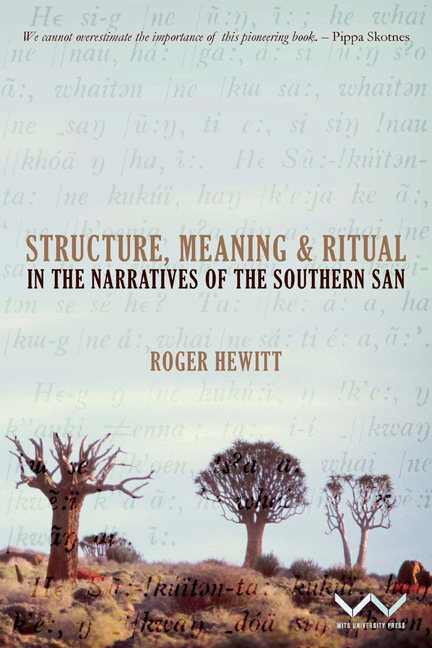Book contents
- Frontmatter
- Dedication
- Contents
- Acknowledgements
- Introduction
- 1 Ethnographic background
- 2 Introduction to the narratives: their context, performance and scope
- 3 Legends and the stories of !Khwa
- 4 Sidereal narratives: the story of the Dawn's Heart and his wife the Lynx
- 5 Animal narratives
- 6 |Kaggen in belief and ritual
- 7 The |Kaggen narratives (1): characters and content
- 8 The |Kaggen narratives (2): sequence and structure
- 9 |Kaggen in belief, ritual and narrative: a synthesis
- 10 Two |Kaggen narratives: compositional variations
- 11 The verbal surface: a note on the narrators
- Appendix A Girls’ puberty observances of the ǀXam
- Appendix B The shamans of the ǀXam
- Bibliography
- Index
Appendix B - The shamans of the ǀXam
Published online by Cambridge University Press: 21 April 2018
- Frontmatter
- Dedication
- Contents
- Acknowledgements
- Introduction
- 1 Ethnographic background
- 2 Introduction to the narratives: their context, performance and scope
- 3 Legends and the stories of !Khwa
- 4 Sidereal narratives: the story of the Dawn's Heart and his wife the Lynx
- 5 Animal narratives
- 6 |Kaggen in belief and ritual
- 7 The |Kaggen narratives (1): characters and content
- 8 The |Kaggen narratives (2): sequence and structure
- 9 |Kaggen in belief, ritual and narrative: a synthesis
- 10 Two |Kaggen narratives: compositional variations
- 11 The verbal surface: a note on the narrators
- Appendix A Girls’ puberty observances of the ǀXam
- Appendix B The shamans of the ǀXam
- Bibliography
- Index
Summary
During the 1930s a substantial number of texts were published by Miss Dorothea Bleek (1931–36, Parts VI–VIII) in which several ǀXam informants, from the Katkop and Strontberg areas of South Africa, described their beliefs and customs with regard to shamans. The ǀXam word !giten was originally translated as ‘sorcerers’ by Miss Bleek's aunt, L.C. Lloyd. Dorothea Bleek herself sometimes used the word ‘medicine men’ to describe the same people. In the account which follows the published texts have been drawn upon together with the remainder of the unpublished material collected by Bleek and Lloyd, in an attempt to organise what is known of these shamans. The general term used here for them is ‘shaman’ but the term favoured by Isaac Schapera (1930: 195ff), ‘magician’, has also been used in places where it makes the sense clearer.
The ǀXam had one word, !gi:xa, for people with special ‘magical’ powers. This applied to rainmakers, medicine men/women and those with a magical influence over certain animals. Rainmakers were said to ‘possess’ rain and game ‘magicians’ to ‘possess’ certain animals. This possession was not exactly one of control, rather it was an ownership of powers capable of influencing these things. While the word !gi:xa was generally used indiscriminately to describe all of these offices, one also finds the word for rain ‘magicians’ used (!khwa-ka !giten, !giten being the plural form of !gi:xa) or, in the case of game ‘magicians’, the name of an animal added to !gi:xa (wai-ta !gi:xa, springbok ‘magician’) as a means of differentiation. Sometimes these offices overlapped and it was usual for game ‘magicians’ also to be curers (L. II, (37), p. 3337 rev.). Game ‘magicians’ and curers could be of either sex but rainmakers seem to have been exclusively male.
Rainmakers
Rainmaking was mainly the province of older, experienced men who were requested, usually by a relative, to make rain at certain times. They were free to accept or refuse the request but from the texts they do not appear to have been paid for their services. It was thought good manners, however, to fetch water once for the rainmaker after he had successfully made rain. The people usually asked a member of the band who was in some way close to the rainmaker to make a request on their behalf but occasionally the rainmaker would do his work unprompted.
- Type
- Chapter
- Information
- Publisher: Wits University PressPrint publication year: 2008



